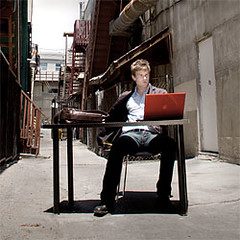Interview by Everett Bogue | Follow me on Twitter.
Every Wednesday on Far Beyond The Stars I interview an important person on the subject of being minimalist.
Last week we visited with David Damron of A Minimalist Path, he spoke about plastic bag usage in the US and how to make your life more minimal.
Next week I’m excited to speak with Leo Babauta of Zen Habits and Mnmlist. Be sure to sign up for free updates so you don’t miss the interview!
–
 For today’s interview, I spoke with Colin Wright of Exile Lifestyle. Colin writes about location independent lifestyle design, and just published an outstanding free e-book on How to be Remarkable.
For today’s interview, I spoke with Colin Wright of Exile Lifestyle. Colin writes about location independent lifestyle design, and just published an outstanding free e-book on How to be Remarkable.
We talked about the challenge of moving to new countries every four months, minimizing possessions, working exclusively online, and his sexy shoes.
Check out the interview below!
Everett Bogue: You’ve set a goal of moving every four months to another country, which I imagine means that you’ve had to really streamline your possessions. What are the essential possessions that you take on on the road for a project like yours?
Colin Wright: Oh man, did I ever streamline. I went from having a two-story townhouse full of stuff (5 computers, a room-sized closet full of clothing, a car AND a scooter AND a bike, etc) to owning only what will fit in a single carry-on bag.
It’s been a major shift, but a really liberating one.
My essentials right now include:
- Macbook Pro – this allows me to work from anywhere in the world
- iPod Touch – for music and movies while traveling, but also to read books (I go through 6-8 per month), since I’ve gone paperless (except for toilet paper and business cards) and only read ebooks these days
- Sexy shoes – they don’t necessarily have to be sexy, but they do have to be comfortable and versatile…the pair I got are Diesel’s that work well with a t-shirt and jeans, or to go clubbing equally well
- One really awesome pair of jeans – mine are from Paper, Denim and Cloth. I’m not usually a $300 pair of jeans guy, but when you’re going to be wearing the same pair for good portion of your week, you want something sturdy, reliable and good-looking
- Unlocked RAZR – I sold my iPhone when I left LA, and intentionally purchased the worst mobile phone I could find. I snagged a sweet deal on a refurbished and unlocked RAZR so that as I travel I can pop in local SIM cards.
- Slim Slimmy Wallet – This is kind of a niche item, but in a lot of countries pick-pocketing is a lot worse than in the US, and Argentina is no exception. A good way to avoid having to worry about this is to get a super-slim, super-minimalist front-pocket wallet, which not only forces you to reduce the number of cards and such that you carry, but also keeps people from ganking your cash in a crowd
- Panasonic LX3 Camera – I went with the LX3 instead of the Canon G10 because the processor is bigger and because it shoots HD-quality video
There’s not really much else…I have a half-dozen shirts, a few other pairs of pants, a newsie-style hat, 2 jackets (1 super-casual, 1 much nicer), a messenger bag, a pair of Vibram Five Finger shoes and some flip-flops. Most of these things are expendable, though, and I could definitely live without them or easily exchange/replace them.
BE: What was the hardest thing to leave behind when you left the country?
CW: Haha, well, one answer is ‘my friends,’ but I imagine you’re looking for something tangible, so definitely my iPhone. I became a bit dependent on it, always checking the GPS or my email or using it to take notes. It was crazy handy to have with me, but I didn’t want to depend on it while traveling and miss out on the confusion and learning experiences I would have without it.
So bye-bye iPhone. I miss you.
EB: When I relocate to a new place, one of the biggest struggles is finding semi-permanent place to live. Could you briefly outline the steps that you took to obtaining your current living situation?
CW: I actually tried really hard to challenge myself with this one. I know that I’ll be moving to a lot of different places, and I won’t always have connections or the ability to reserve a place ahead of time, so I decided to give myself two days in a hotel once I arrived in Buenos Aires in which to find an apartment.
In those two days I must have walked 40 miles, going from place to place looking for an apartment in my price range to rent. Eventually I found an agency that helps people from out of town rent furnished apartments longer term. I had to figure out ways around the system (the ATMs here only let you take out a certain amount of cash per day, this agency doesn’t take plastic, and I had to pay everything up front!), but I’ve found that in most cases, people will help you out if they can, even if it means breaking the rules a little.
EB: I’ve noticed that you’re attempting to engage in the post geo-graphical world by taking your business online. What is the biggest challenge that you’ve overcome in finding clients that will work with someone who they can’t meet in person?
CW: To be perfectly honest, most of what I’ve done for a long time has taken place online. I still do print design from time to time, but a lot of my work now is either web design and development or consultations; both are easy to do via email or Skype.
Some of my clients that are a little more old school initially had issues with it. However, after going back and forth a bit and showing them that working with them online from Buenos Aires isn’t much different from working with them online in Los Angeles, their concerns are largely assuaged.
EB: What is the most rewarding aspect of taking yourself and your business completely mobile?
CW: It’s amazing how not having a home can remove so much stress. All of a sudden I can travel without worrying about where my car is parked or if there are termites in my apartment or if I left the oven on…everything that I own in the world is right here with me.
Being able to travel to far-flung places has been great for building my network, too. I’ve met some absolutely AMAZING people here in Buenos Aires, and a lot of them also just happen to be great business connections. I’m going to do my best to help them, they’ll do their best to help me, and hopefully I can continue to build my network throughout the rest of the world.
EB: What is the number one way that you are pursuing income automation and how much success with it have you had so far?
CW: I’ve tried a number of different tactics – ads, affiliates, outsourcing, etc – and have found that none of the major existing methods of automating income is really my cup of tea. I care too much about my reputation and the design of my sites to inundate them with banners, I don’t want to risk losing my legitimacy by pitching too many products, and on and on.
At this point I’m basically planning on using Exile Lifestyle as a launch pad for businesses forking off in a few different directions.
My endgame for writing is to get a book published, and in pursuit of this I’m creating a lot of written content, making an effort to get out into the world and do interesting things and make connections that could lead to that kind of deal. I’m also looking at options related to creating video content, educational modules and even clothing (I’ve done illustrations and graphics for many t-shirts over the years).
My main focus is providing value, building a solid community and upping my numbers so that if and when an opportunity comes around to make use of the brand I’m building, I’ll be ready for it.
Check out Exile Lifestyle, and definitely read Colin’s free e-book on How to be Remarkable.
–
Are you interested in being interviewed about being minimalist? Drop me a note on Twitter.
